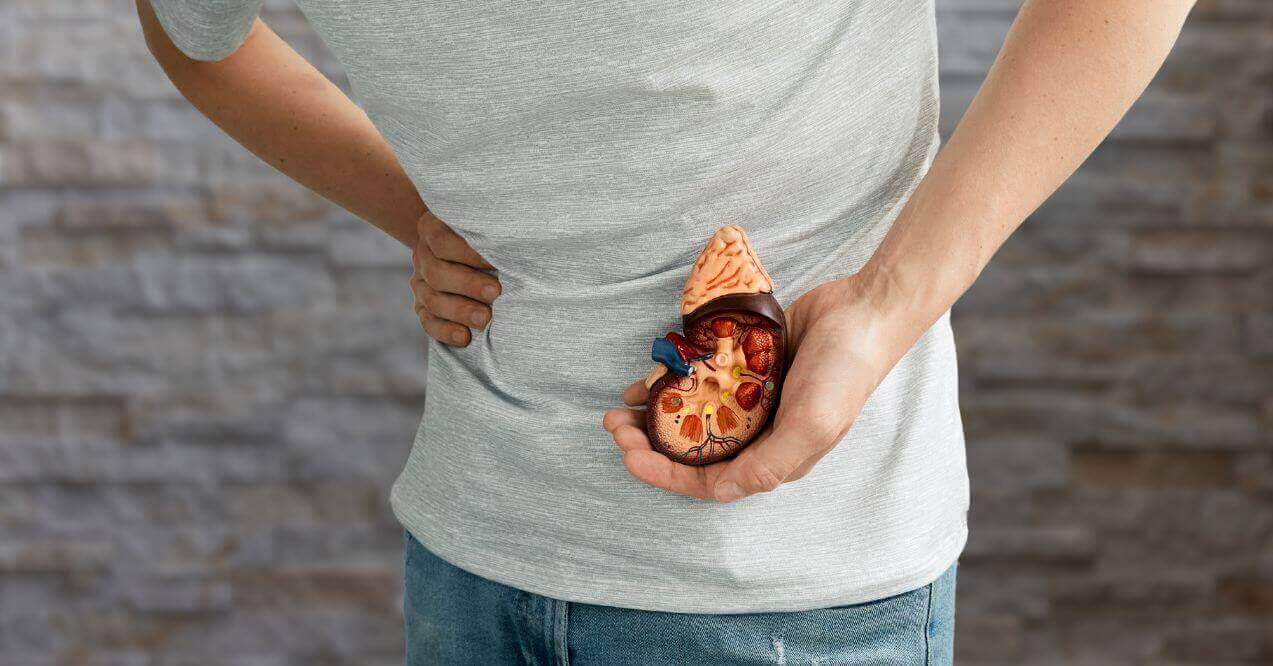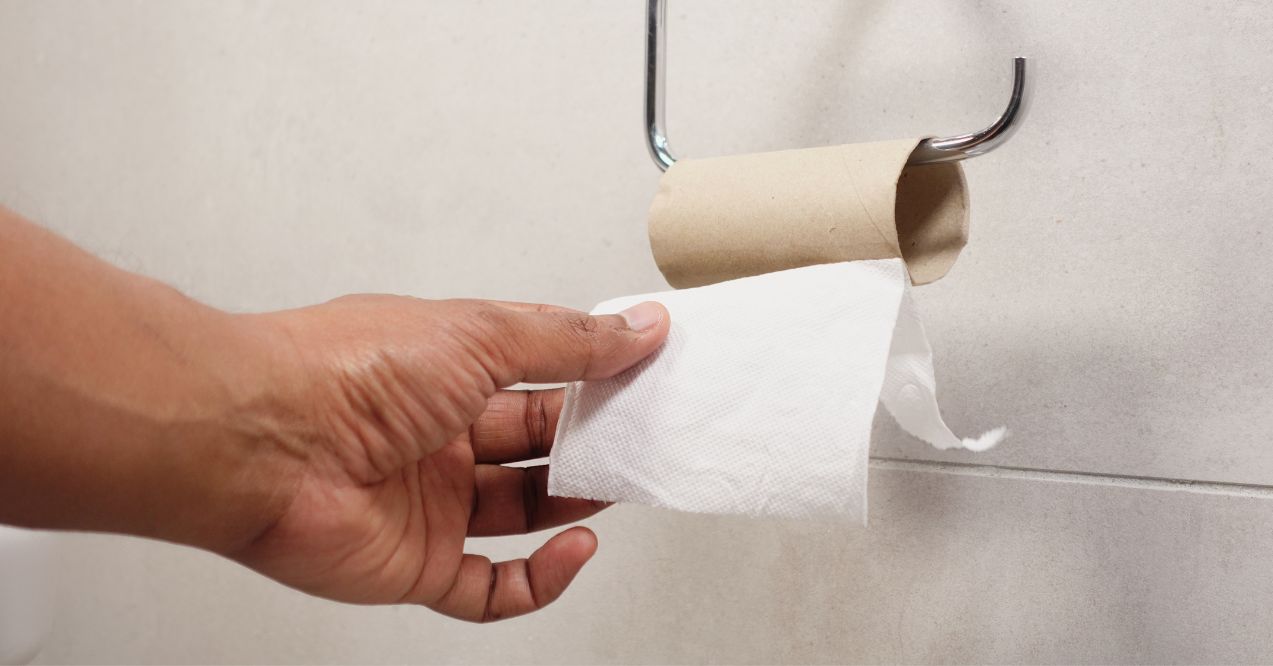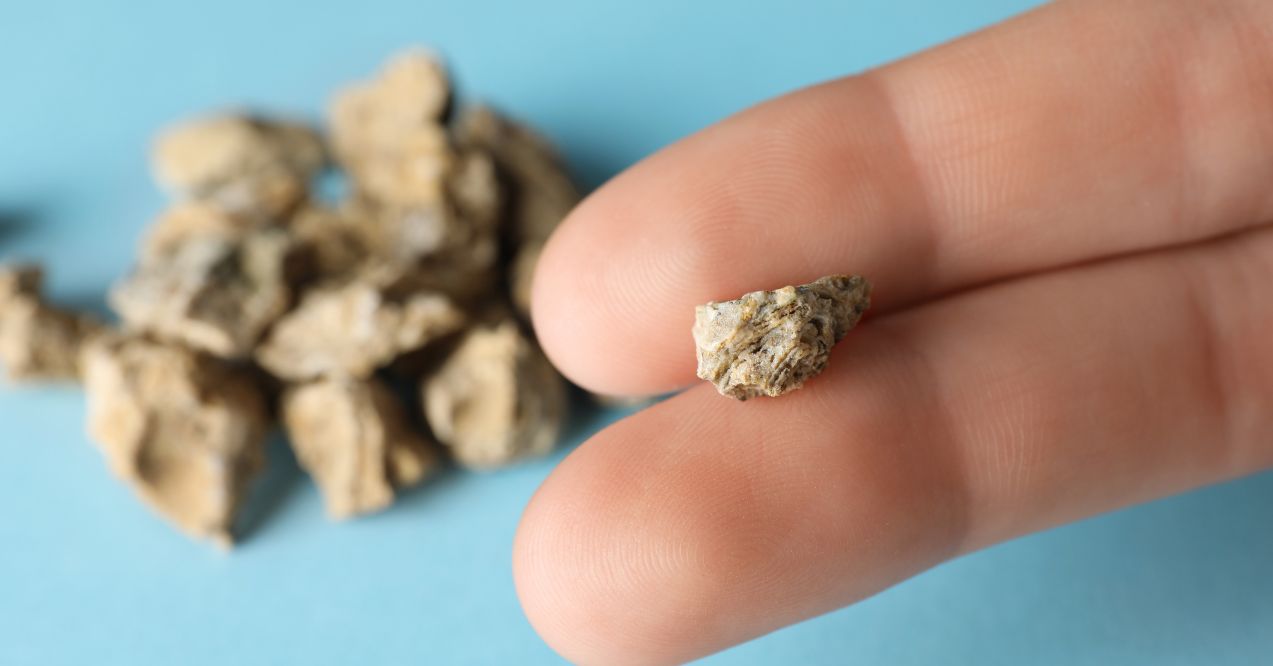Do Energy Drinks Cause Kidney Stones?
Medically reviewed by our experts
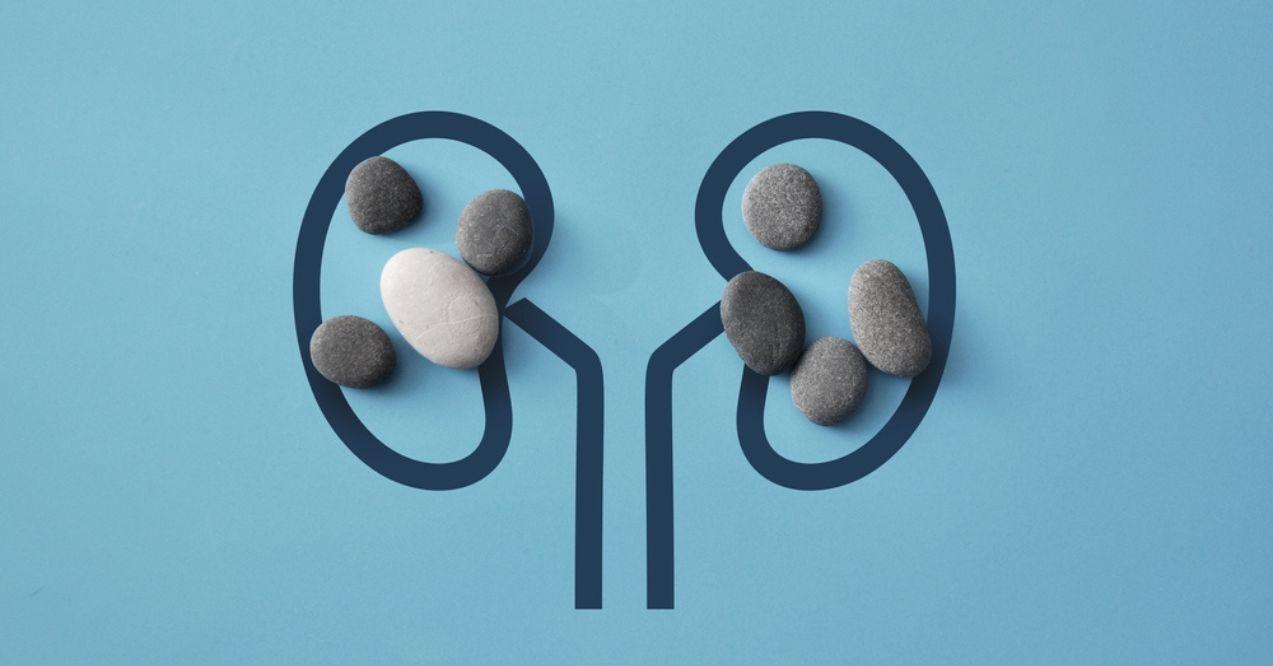

Worldwide, the specter of kidney stones haunts millions, casting shadows of pain and recurrence even after treatment. A key preventive measure against these unwanted mineral accumulations? Monitoring our caffeine consumption in popular beverages like energy drinks, coffee, and soda. But out of curiosity, do energy drinks cause kidney stones? Dive in, empathize with your body, and find out.
Kidney stones emerge from the gathering of chemical crystals in our renal system. Unraveling the exact cause is a puzzle, with factors like dietary habits and metabolic nuances playing their parts. Some energy drink components can tip the mineral balance, increasing the risk of stone formation.
Craving clarity on this link between energy drinks and kidney stones? Let’s decode the elements in these drinks to illuminate how they affect our renal health. The risk of kidney stones is ultimately affected by the levels and combinations of minerals, calcium phosphate, or calcium oxalate found in these drinks. If you’re still wondering, do energy drinks cause kidney stones? Read on to further understand these ingredients and explore if or how energy drinks may cause kidney stones.
What Is in Energy Drinks?
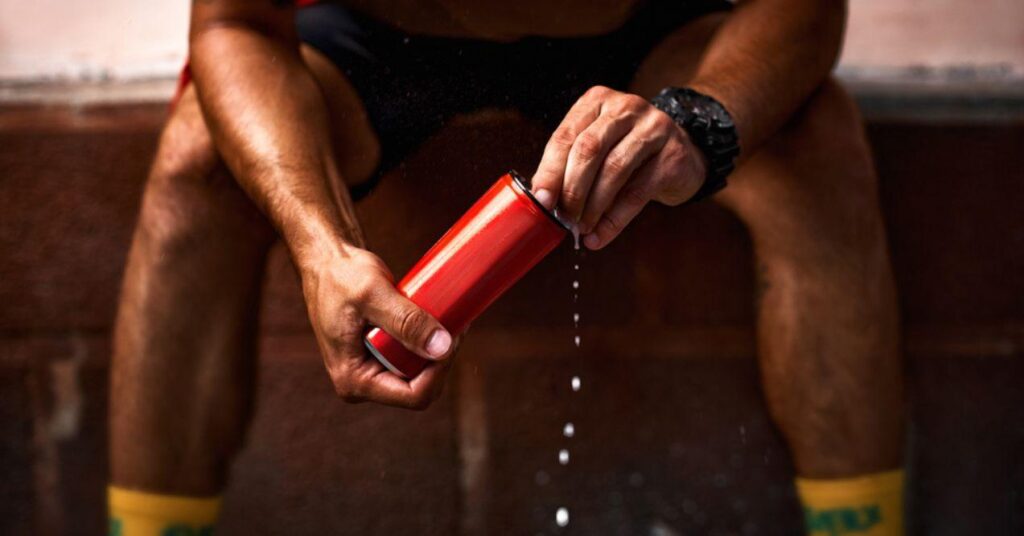
Energy drinks have surged in popularity, hailed for their promises of mental alertness and physical vitality. But what’s the secret sauce behind these tantalizing claims? Let’s dissect the primary components and understand the essence of these beverages.
Sugar in Energy Drinks
Ever wondered why energy drinks taste sweet? They’re laden with sugars, often including fructose and glucose, which are responsible for the sweet allure and calorie content. Surprisingly, many leading brands sneak in a whopping 41 grams of sugar in a single can – a number soaring past typical sodas.
While sugar may provide an instantaneous energy high, it comes with strings attached. Notably, it sharply contrasts the American Heart Association’s advice: 36 grams daily for men and just 25 for women. Riding the sugar rollercoaster means a brisk rise in energy but brace for the inevitable nosedive.
The stakes go beyond fleeting energy levels. A sugar-rich diet, propelled by excessive energy drink consumption, correlates with formidable health adversaries like metabolic syndrome, stroke, type 2 diabetes, and heart diseases. Thus, if your beverage preferences lean sugary, pivoting to sugar-free variants could be a life-affirming choice.
Caffeine in Energy Drinks
Caffeine, the legendary stimulant, finds a revered place in many daily rituals, especially within the realm of energy drinks. But how much caffeine is truly coursing through these cans?
Surprisingly, the numbers can be eye-opening. While a modest-sized can might serve you a dose of 80 milligrams (mg), some of the heftier ones boast a staggering 215 mg. To put that in perspective, it’s a concentration surpassing most coffees or teas, the traditional caffeine vehicles, since the average cup of coffee delivers about 80-100 mg of caffeine.
Here’s the twist: while caffeine pledges invigoration, the uplift is ephemeral. As the initial rush subsides, lethargy often claims the stage, luring individuals into a cyclic chase for the next caffeine fix. This loop can evolve into a concerning dependency.
High caffeine intake, predominantly from excessive energy drink consumption, packs potential pitfalls: disrupted sleep cycles, cardiac irregularities, and persistent headaches. And a word of caution for the youth: going overboard with these beverages can amplify these risks, warranting prudent consumption.
B-Vitamins in Energy Drinks
Navigating the myriad of ingredients in energy drinks, B-vitamins stand out as significant contributors. But why are these vitamins a staple in such beverages?
B-vitamins, including thiamin (B1), biotin (B7), and riboflavin (B2), play a crucial role in our body’s metabolic processes. Their primary job? Assisting in the conversion of carbohydrates into usable energy. Neglecting these essential nutrients can lead to feelings of fatigue, even if one’s diet appears balanced on the surface. Aware of their potential, many energy drink producers supplement their beverages with B-vitamins, aiming to deliver a consistent energy boost.
Furthermore, some B-vitamins play a part in the body’s inflammatory response. While this property can have various health implications, it’s important to note that the direct correlation between B-vitamins and kidney stone prevention or treatment is not clearly established.
A word of caution for the wellness seekers: balance is key. If your dietary intake already fulfills your B-vitamin needs, extra supplementation won’t supercharge your energy. Additionally, most people get enough vitamin B from their daily food intake. Any surplus of these water-soluble vitamins is typically excreted via urine without additional health benefits. Thus, when eyeing that next energy drink, reflect on its value: are you gaining genuine nourishment, or merely consuming excess?
Sodium in Energy Drinks
Sodium is a vital mineral that plays a pivotal role in our body’s functionality, aiding in nerve and muscle function and balancing the fluid inside and around our cells. When it comes to energy drinks, the sodium content can differ widely depending on the brand and formulation.
While sodium is undeniably essential, moderation is key. The U.S. Food and Drug Administration (FDA) recommends less than 2,300 mg of sodium per day for most adults (less than 1 teaspoon of table salt!). Some energy drinks, depending on their size and formula, can provide a significant portion of this recommended amount.
Excessive consumption of energy drinks with high sodium content can lead to water retention, potentially elevating blood pressure. Moreover, it might disrupt the delicate balance of electrolytes in our system, which can result in health issues like irregular heart rhythms.
Do Energy Drinks Cause Kidney Stones? Lets Find Out
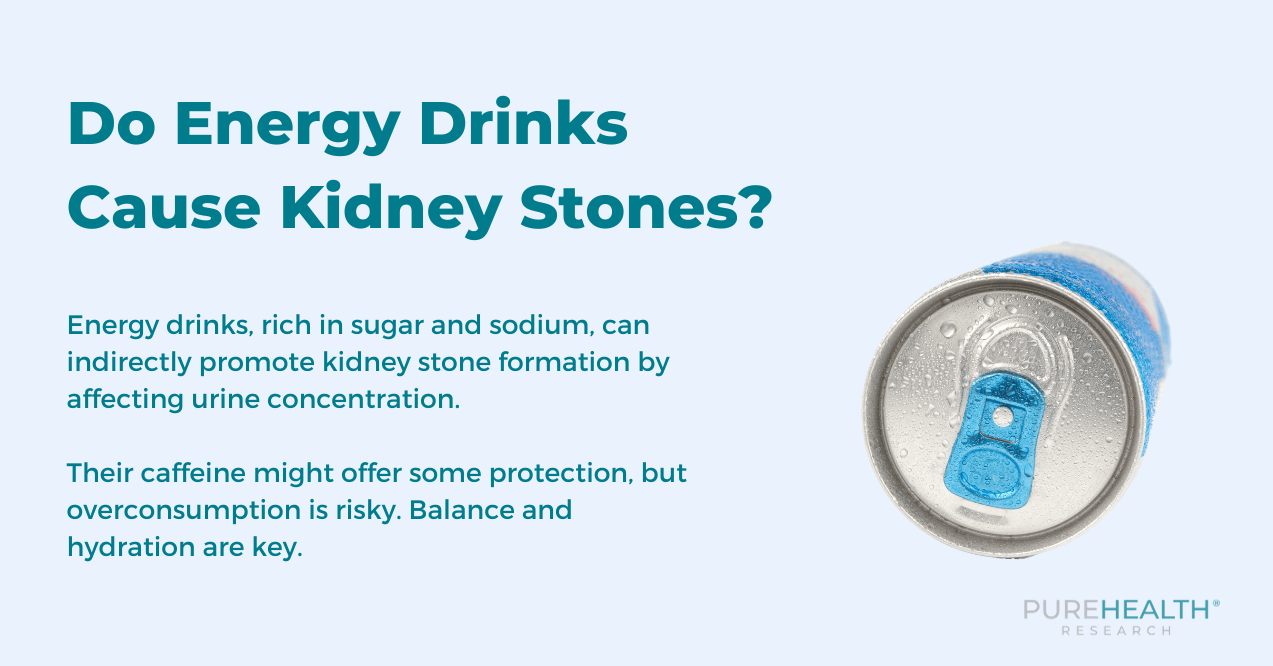
Energy drinks often contain ingredients that have been linked, either directly or indirectly, to the formation of kidney stones. The presence of certain minerals or compounds in high concentrations can set the stage for stone development, but how do energy drinks fit into the picture?
Kidney stones arise when substances like calcium, uric acid, and oxalate accumulate in the urine in high concentrations. If the urine doesn’t contain enough of certain substances that prevent these crystals from sticking together, stone formation can be promoted. A diet high in sodium can exacerbate this, increasing the calcium concentration in the urine.
Energy drinks, with their mix of sugar, sodium, and, can influence this balance. Here’s a closer look:
Dehydration
Dehydration and energy drinks have a nuanced relationship. Contrary to popular belief, consuming energy drinks doesn’t automatically lead to dehydration. However, many of these beverages come loaded with high amounts of sugar, which can induce thirst. This sensation, if not adequately addressed by drinking water, might mean the body doesn’t get the hydration it needs. The consequence? Urine becomes more concentrated, with elevated levels of substances that can crystallize and form stones.
It’s crucial to understand this interplay: while the drink itself doesn’t directly cause dehydration, its effects on the body’s hydration cues can be significant. Thus, pairing your energy drink with adequate water intake helps to flush excess oxalates and, therefore, allows to safeguard the kidney health.
High Levels of Caffeine
Caffeine serves multiple roles in our body. As a diuretic, it naturally boosts urine production, which might assist in clearing out potential kidney stone-forming substances. However, when consumed in large amounts, there’s a risk of upsetting the body’s hydration balance, possibly setting the stage for stone formation in the kidneys.
But, recent research provides an interesting twist. Studies suggest that moderate caffeine consumption may, in fact, reduce the risk of kidney stones. Despite its diuretic nature, the protective benefits of caffeine have been highlighted in various studies, showing a potential decrease in kidney stone risks among regular consumers.
Nevertheless, the rule of thumb remains: balance is essential. When indulging in high-caffeine drinks, it’s vital to keep tabs on quantity and ensure you’re hydrating effectively. A mindful approach to caffeine consumption can be the golden ticket to savoring your favorite drinks while safeguarding kidney health.
Salt or Sodium Content
Sodium is an essential mineral in the body, playing a pivotal role in maintaining cellular hydration and working in tandem with potassium to support various physiological functions. However, excessive sodium intake can lead to higher calcium levels in the urine, which might increase the risk of calcium kidney stones.
Consuming large amounts of salt can promote thirst; if not adequately addressed by increasing water intake, it could lead to dehydration—a concern for those at risk of kidney stones. It’s not that sodium helps dissolve calcium in the urine, but rather, high sodium levels can lead to increased calcium in the urine, which can elevate the risk of stone formation. It’s vital to monitor sodium intake to maintain kidney health and reduce the risk of stone development.
Sugar Levels
Excessive consumption of sugary beverages might increase the risk of kidney stones. Many sugar-sweetened energy drinks contain high amounts of fructose, which, when metabolized, can raise the levels of calcium, uric acid, and oxalate in the urine — all of which contribute to kidney stone formation.
While the exact relationship between sugar intake and stone formation is complex, it’s believed that high sugar consumption can exacerbate factors linked to stone formation. Thus, it’s essential to moderate the intake of sugary and sweetener-rich beverages, like energy drinks, to maintain kidney health.
Do Sugar-Free Energy Drinks Cause Kidney Stones?

You might ask, “Do sugar-free energy drinks lead to kidney stones?” These beverages often contain artificial sweeteners like sucralose, aspartame, or others. Opting for sugar-free choices won’t raise blood sugar levels, which can be beneficial for people with certain health conditions.
The relationship between artificial sweeteners and kidney stone risk isn’t entirely clear. Some studies have indicated a potential correlation between diet soda consumption and kidney stones, but the specific reasons for this association are not fully understood. It’s suggested that some artificial sweeteners might affect factors linked to stone formation.
While the concentration of artificial sweeteners in sugar-free drinks can vary by brand and formulation, it’s essential to approach the consumption of these beverages with moderation. Until more definitive research is available, it’s prudent not to make absolute claims about the impact of sugar-free energy drinks on kidney stone risk.
How to Prevent Kidney Stones From Energy Drinks?
To mitigate the risk of kidney stones associated with beverage consumption, consider the following measures:
Drink More Water
The best way to prevent kidney stone formation is to stay hydrated. While the often-recommended guideline is six to eight glasses of fluid daily, it’s essential to adjust based on individual needs, especially during hotter months. While all fluids count toward hydration, water is the most optimal choice. Staying well-hydrated helps the body flush out potential stone-forming substances.
Eat Plenty of Calcium-Rich Foods
It might seem counterintuitive, but consuming calcium-rich foods can help prevent kidney stones. When calcium binds with oxalates in the digestive tract, it prevents them from entering the kidneys. Foods rich in calcium include dairy products, bok choy, broccoli, and fortified foods. However, be cautious with foods high in oxalates, like spinach, as they can contribute to stone formation when not consumed with a source of calcium.
Supplementation
Incorporating supplements for kidney health can be an effective way to support overall kidney function and prevent the formation of kidney stones. Supplements like magnesium and citrate help maintain a healthy mineral balance, reducing the likelihood of stone development. Herbal remedies, such as cranberry extract and dandelion root, are also known to promote kidney health by helping flush out toxins and reduce inflammation. However, it’s essential to consult with a healthcare provider before adding supplements to your routine, especially for those with pre-existing kidney conditions.
Additionally, for individuals with kidney disease, it’s essential to follow a tailored diet plan. A well-designed 7-day meal plan for kidney disease can provide guidance on balancing calcium-rich foods with those high in oxalates, ensuring optimal kidney health.
Final Thoughts
Do energy drinks cause kidney stones? Excessive consumption of energy drinks can heighten your risk for various health issues due to their sugar content. While sodium content can vary among energy drinks, excessive intake could contribute to electrolyte imbalances.
While typical energy drinks don’t directly contain minerals like oxalate or calcium phosphate that are known to form stones, it’s essential to consider the overall diet and lifestyle factors. Sugar-free options, though beneficial for reducing sugar intake, can still contain artificial sweeteners, whose effect on kidney stone risk is yet to be conclusively determined.
A balanced approach, which includes drinking sufficient water and consuming calcium-rich foods, can support kidney health.
Energy drinks can contribute to the risk of kidney stones due to their high content of sugar, sodium, and caffeine. These ingredients can lead to dehydration and increased urine concentration, which promotes the formation of kidney stones.
To mitigate the risk, ensure you stay well-hydrated by drinking plenty of water. Additionally, balance your diet with calcium-rich foods to prevent oxalate absorption in the kidneys and moderate your intake of energy drinks, focusing on sugar-free options when possible.
Energy drinks often contain high levels of sugar, caffeine, and sodium. Excessive sugar can increase levels of calcium, uric acid, and oxalate in urine, while caffeine acts as a diuretic and can lead to dehydration. High sodium intake can raise calcium levels in urine, all contributing to the risk of kidney stones.




